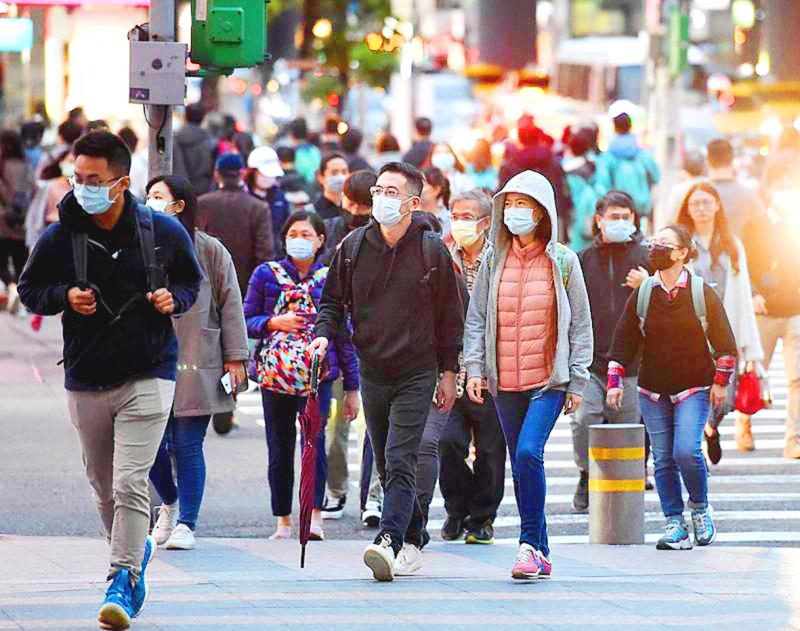People in Taipei, New Taipei City and Keelung can expect about 40 hours of temperatures below 10°C, starting this afternoon, due to the arrival of a cold front, the Central Weather Bureau said yesterday.
Temperatures in northern and central Taiwan could dip below 10°C by this afternoon, as the cold front is expected to move quickly toward the nation, it said.
“Residents in the greater Taipei area would feel temperature differences more acutely than those in other parts of the nation, as they could experience temperatures below 10°C for about 40 straight hours,” Weather Forecast Center Director Lu Kuo-chen (呂國臣) said.

Photo: Hsiao Yu-hsin, Taipei Times
The most powerful cold front that Taiwan has experienced occurred in 2016, which lasted 61 hours for residents in the greater Taipei area, Lu said.
Although it does not appear today’s cold front would equal or exceed the one four years ago, the apparent temperatures — those perceived and felt by people — might be comparable, Lu said.
While the cold front is expected to affect the north of the country longer than other areas, residents in central and southern Taiwan could experience temperatures lower than those in the north because of radiative cooling effects, he said.
Lows in northeastern Taiwan and north of central Taiwan would be about 7°C to 8°C between tomorrow and Friday, while other parts would see lows of about 10°C, while snow could fall on mountains between 1,000m and 2,000m from tomorrow night to Friday morning, the bureau said.
However, this year is to go down in the nation’s climatic history as the warmest ever, with the accumulated rainfall in the mountains in central Taiwan accounting for just 50 to 70 percent of the climate average, the bureau’s data showed.
April and October were the only months that had average temperatures close to the normal range, but average temperatures in the other months exceeded the climate average and made it to the top 10.
As of Sunday, the nation’s average temperature this year was 24.62°C, higher than last year’s 24.55°C and a new record, the bureau said.
The highest temperature in the nation, 40.2°C, was measured on July 25 at the Dawu (大武) Observation Station in Taitung County, it said, adding that it tied the previous record.
The rainfall in June, July and September was significantly less than the climate average, the bureau said, adding that only accumulated rainfall in the northeast region and southern coastal area was between normal and slightly more than the climate average.
The La Nina effect is expected to gradually weaken after next spring, Lu said.
Records showed that the average temperatures from January to March after a La Nina Year would be lower than normal and rainfall in the west coast would be below the normal range, he said.
Average temperatures in the next three months are likely to be close to the normal range, but the rainfall could be between low and normal, he said.

The US government has signed defense cooperation agreements with Japan and the Philippines to boost the deterrence capabilities of countries in the first island chain, a report by the National Security Bureau (NSB) showed. The main countries on the first island chain include the two nations and Taiwan. The bureau is to present the report at a meeting of the legislature’s Foreign Affairs and National Defense Committee tomorrow. The US military has deployed Typhon missile systems to Japan’s Yamaguchi Prefecture and Zambales province in the Philippines during their joint military exercises. It has also installed NMESIS anti-ship systems in Japan’s Okinawa

TRAGEDY STRIKES TAIPEI: The suspect died after falling off a building after he threw smoke grenades into Taipei Main Station and went on a killing spree in Zhongshan A 27-year-old suspect allegedly threw smoke grenades in Taipei Main Station and then proceeded to Zhongshan MRT Station in a random killing spree that resulted in the death of the suspect and two other civilians, and seven injured, including one in critical condition, as of press time last night. The suspect, identified as a man surnamed Chang Wen (張文), allegedly began the attack at Taipei Main Station, the Taipei Fire Department said, adding that it received a report at 5:24pm that smoke grenades had been thrown in the station. One man in his 50s was rushed to hospital after a cardiac arrest

‘WIN-WIN’: The Philippines, and central and eastern European countries are important potential drone cooperation partners, Minister of Foreign Affairs Lin Chia-lung said Minister of Foreign Affairs Lin Chia-lung (林佳龍) in an interview published yesterday confirmed that there are joint ventures between Taiwan and Poland in the drone industry. Lin made the remark in an exclusive interview with the Chinese-language Liberty Times (the Taipei Times’ sister paper). The government-backed Taiwan Excellence Drone International Business Opportunities Alliance and the Polish Chamber of Unmanned Systems on Wednesday last week signed a memorandum of understanding in Poland to develop a “non-China” supply chain for drones and work together on key technologies. Asked if Taiwan prioritized Poland among central and eastern European countries in drone collaboration, Lin

ON ALERT: Taiwan’s partners would issue warnings if China attempted to use Interpol to target Taiwanese, and the global body has mechanisms to prevent it, an official said China has stationed two to four people specializing in Taiwan affairs at its embassies in several democratic countries to monitor and harass Taiwanese, actions that the host nations would not tolerate, National Security Bureau (NSB) Director-General Tsai Ming-yen (蔡明彥) said yesterday. Tsai made the comments at a meeting of the legislature’s Foreign Affairs and National Defense Committee, which asked him and Minister of National Defense Wellington Koo (顧立雄) to report on potential conflicts in the Taiwan Strait and military preparedness. Democratic Progressive Party (DPP) Legislator Michelle Lin (林楚茵) expressed concern that Beijing has posted personnel from China’s Taiwan Affairs Office to its